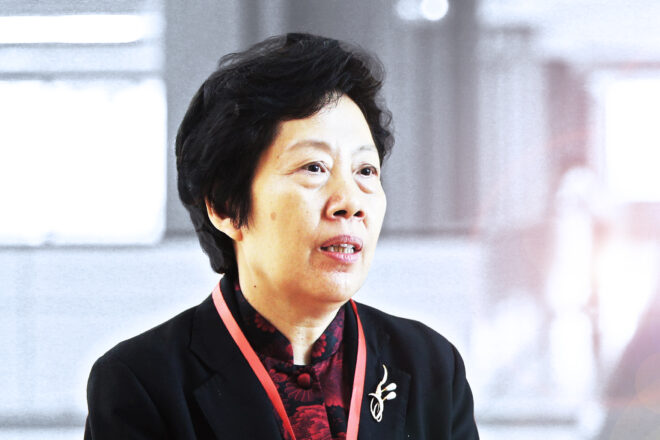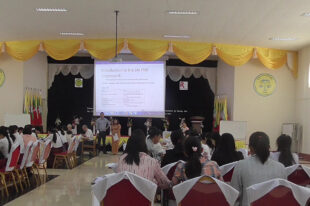CNAO AG Calls for Audit Community to “Stand Higher”

Ms. Hu Zejun, CNAO Auditor General, Shares Importance of Building Capacity, Engaging Stakeholders, Seeing the Bigger Picture
Since her appointment as Auditor General of the National Audit Office of China (CNAO), Ms. Hu Zejun has often used the phrase, “Standing higher,” a metaphor that auditors should stand higher to better understand the overall situation and development trends—to get a better grasp of the bigger picture.
The notion of “standing higher” is more important than ever as Supreme Audit Institutions (SAIs) face increasingly higher external expectations due to the rapid development of government auditing.
SAIs, now performing much more than book checking as the word “audit” implies, are actively contributing to national governance through such initiatives as auditing performance and efforts to attain the Sustainable Development Goals (SDGs).
Additionally, the Beijing Declaration, adopted at the XXI International Organization of Supreme Audit Institutions (INTOSAI) Congress, called for SAIs to help enhance national performance, transparency and accountability, and protect citizens’ interests.
These efforts, aimed at improving good governance, alongside the INTOSAI consensus to meet expectations of various stakeholders, demands a change in mindset and improved capacity.
“We must be fully aware of our mission as auditors, achieve our goals through operations (both innovative and standard) and establish our credibility through self-improvement. By setting up a sound training and management mechanism for auditors, we hope to build a team of high-quality, results-oriented, professional auditors with conviction, expertise and integrity,” Ms. Hu emphasized.
The CNAO has employed several initiatives to help auditors stand higher, change how they think, broaden horizons and stay up-to-date on the latest governance issues and guidance. Centralized, practical training modules and the “Audit Lecture Series” are two such programs that have brought impressive results to the CNAO.
Ms. Hu believes capacity building is a central task for all SAIs, one that is key to being able to see the bigger picture, one crucial to achieving long-term goals, and one that should extend well beyond a SAI’s borders—into the regions and the INTOSAI community.
This is also true of working together, collaborating and cooperating across all levels with all stakeholders— aspects she deems essential to building a community with a shared future.
“To help promote national governance, SAIs cannot solely rely on internal efforts. Stakeholders, particularly legislature, media and the public, play an important role and should be well-informed to better support, understand and cooperate with SAIs.”
Legislative support is conducive to improving a SAI’s overall effectiveness, particularly in developing and improving audit laws and regulations that not only comply with national conditions, but also ensure sufficient audit responsibilities and rights.
In the information era, all media types are important to message delivery and government auditing influence. Ms. Hu believes SAIs should develop skills in working with media, as effective communication can help avoid misinterpreting audit findings. She champions the idea of shifting the media’s focus to problem-solving rather than problem-reporting to help foster good governance.
The public can shape oversight synergy. Social progress occurs through citizen involvement in public affairs, and SAIs provide an important channel to understanding and monitoring government performance. Establishing a solid system to announce audit results supports safeguarding public rights; guides and mobilizes the public to implement an effective watch over government departments; and drives continuous governance improvement.
Ms. Hu underscored that stakeholder engagement should not be considered a negative aspect of a SAI’s work and noted it should “be approached with an open and inclusive attitude on the premise of objectivity and impartiality.”
Ms. Hu further explained that the CNAO attaches great importance to stakeholder collaboration, thus creating a positive external environment.
The CNAO extensively solicits opinions and suggestions from relevant government departments and all sectors of society. These opinions and suggestions become important references in developing audit plans. The CNAO has also developed and improved its coordination mechanism with relevant authorities to facilitate transferring identified concerns to appropriate entities.
In recent years, the CNAO put forth stronger efforts to publicly announce audit results, improve auditing transparency and protect the public’s right to know.
Ms. Hu recently assumed the role of Secretary General for the Asian Organization of Supreme Audit Institutions (ASOSAI), and commends the ASOSAI and INTOSAI multi-level cooperative mechanisms that have afforded active collaboration on important international issues and have resulted in a large number of influential results.
Globally, INTOSAI’s work with the United Nations (UN) is extremely significant. INTOSAI and the UN hold regular symposiums and jointly promote adopting UN resolutions on auditing, including the 2030 Agenda for Sustainable Development, where both organizations have recognized SAI importance in contributing to SDG implementation.
As Asia accounts for 60% of the global population, about 30% of the global area, and 36% of the global gross domestic product, the CNAO and ASOSAI play major roles in the global sustainable development endeavor.
“We should continue to work closely with stakeholders including the UN, donors, standard-setting organizations, and respond actively to stakeholder support and concerns,” she added.
Creating opportunities to incorporate stakeholders into audit work and fully embracing ideas and mechanisms to build capacity not only generate more effective, efficient and impactful audit reports, they also lead to equally effective, efficient and impactful auditors on the path to see the bigger picture, a path to “stand higher.”





